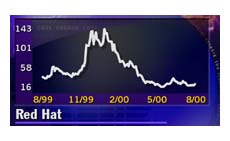|
Red Hat, IBM ink alliance
|
 |
August 15, 2000: 3:16 p.m. ET
Linux software provider and Big Blue in joint marketing agreement
|
NEW YORK (CNNfn) - Red Hat Inc., a leading distributor of the Linux operating system, and computer giant IBM agreed to jointly promote and sell each other's Linux-based software, expanding the previous alliance between the two companies and aiding the spread of Linux.
Research Triangle Park, N.C.-based Red Hat (RHAT: Research, Estimates) said Tuesday that the two companies will jointly market and support bundled IBM, Lotus, Tivoli and Red Hat software. Lotus and Tivoli are divisions of IBM. Programmers from IBM and Red Hat will optimize popular IBM software such as DB2 Universal Database, WebSphere, Lotus Domino, and Tivoli Framework for Red Hat's version of Linux.
The announcement, made at the LinuxWorld Conference and Expo being held in San Jose, Calif., extends a relationship between Red Hat and IBM that began in early 1999, when IBM first announced its support for Red Hat Linux. Since then, the two companies have worked closely on several projects designed to advance the adoption of Linux and open source software.
"The past year has seen an accelerating pace of development that signals wide customer acceptance of open source software and Linux into mainstream computing," Matthew Szulik, Red Hat's CEO, said in a news release. "This agreement is perhaps one of the most significant developments so far. IBM is the gold standard for computing."
"There is a more significant revenue component to this relationship," Paul McNamara, vice president of products and platforms at Red Hat, told CNNfn.com. "IBM is making available to us their portfolio that runs on Linux; we can then incorporate that software into Red Hat products and jointly sell those products."
 Red Hat is one of numerous companies that specialize in software and solutions based on the Linux operating system. Linux is an "open-source" operating system, which means that it is in the public domain and open to modifications by independent developers. Other companies that compete in this market include VA Linux (LNUX: Research, Estimates) and Caldera Systems (CALD: Research, Estimates). Red Hat is one of numerous companies that specialize in software and solutions based on the Linux operating system. Linux is an "open-source" operating system, which means that it is in the public domain and open to modifications by independent developers. Other companies that compete in this market include VA Linux (LNUX: Research, Estimates) and Caldera Systems (CALD: Research, Estimates).
Linux has been seen by many as an emerging rival to Microsoft's ubiquitous Windows operating system, and has been gaining strength in the server market, especially among dot.coms. According to International Data Corp., paid Linux shipments grew faster than any other server operating system over the past two years. Figures for 1999 show Linux shipments held 24.6 percent of the server operating system market, up from 15.8 in 1998.
Research firm Netcraft Inc. says that as of May 2000, 30 percent of all public Web sites run on Linux-based operating systems, making Linux the most popular choice for deploying public Web sites. IDC research shows 40 percent of all spending on Linux servers is for Internet-related applications, firmly entrenching Linux servers in the Internet infrastructure.
While Linux has gained a large amount of "mindshare" among software developers, that hasn't translated into large revenue for Red Hat, largely because Linux can be downloaded for free over the Web. In the most recent quarter, Red Hat lost $14.9 million on revenue of just $16 million. The company's stock price has drifted into the 20s from a high of 151 late last year, as Linux-mania has subsided.
In late afternoon trading, Red Hat was up 3-1/8 at 24-5/16, a 14 percent gain. 
|
|
|
|
|
 |

|

